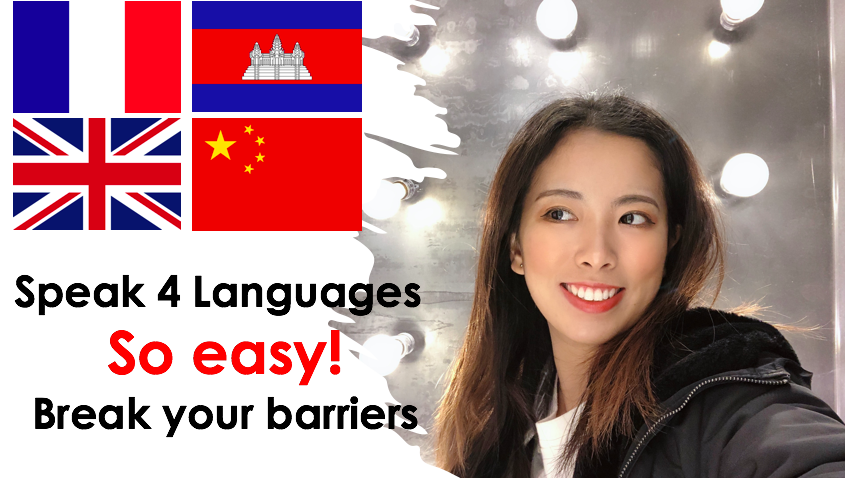
Language seems to be one of the first barriers when studying abroad. When I studied overseas in an Eastern and a Western country, I found it so difficult to understand local people in spite of having learnt the local language for a long time. However, even though languages are different, I found out the same cool ways to break the barriers down.
1. Prepare as much as you can beforehand
Make your academic words list
It is normal that you may not understand the local language during the first few weeks. In particular, your lecturer would use many academic and technical words which would really blow your head off. Therefore, it is essential to prepare as much as you can before your arrival in a foreign country.
- Research your subject’s specific words in advance.
When I came to study MSc Events Management in the University of Lincoln, I need to learn Accounting and Finance in event budgeting which I have never touched before. Therefore, I compiled a list of academic terms and understand them in Chinese first, and then translate into English, which is much easier and save lots of time.

2. Foreign Language Centre
Use the resources on Campus/ Online
Most universities will have Language Centres on campus. Take the University of Lincoln as an example, there are 2 different language courses as follows:
- PEASS course (Pre-sessional English and Academic Study Skills):
students attend before their main course; need to pay for tuition fees and extra accommodation. - In-sessional courses: during term time; free.

Both courses focus on academic study skills including essay writing, culture and communication, seminar discussion, academic grammar, academic listening and note-taking, critical reading, etc
It is beneficial to join both courses. In-sessional courses can help you get used to local life earlier while in-sessional courses strengthen your memory and enrich your experience with more about local culture.
If you can’t find a Foreign Language Centre on campus, find one online!
Useful foreign language learning platform: Italki
(I use it to pass my French DELF exam twice.)

3. Watch local TV, movies, YouTube or listen to podcasts
Do you have this feeling?
“Oh I’ve been learning French so long, but I can’t really understand what they are talking about.”
Don’t panic! It is so normal. Local media is your best friend whether in language or social life. When you watch TV shows, you can notice their accent as well as the shape of the mouth.
- Shadow reading and try to imitate them. Shadowing reading is to repeat the text and summarise the text that you have repeated (Commander and Guerrero, 2013).
- When you struggle to learn a foreign language, do it in an enjoyable way!
When I went to study abroad in Cambodia, I can’t really understand their accent especially the Phnom Penh (capital city) accent, which is 80% different from the standard accent. They pronounce ខ្ញុំ (knom) as ញុំ (niom), which means I. ប្រាំ(blam) becomes ផាំ(piang), which means five. I watched lots of TV shows every day, which was enjoyable and I can learn more about their accent at the same time.
4. Speak with the locals, think like a local
Don’t use Google to translate all the time!!! This doesn’t help at all!!!
- Try to adopt a foreign way of thinking.
- Talk to people.
If you are learning French, think it in a French way. This could impact your expression effectively. As you get used to thinking in a French way, you may speak French more fluently.
Ask local people to help you if you don’t understand. Don’t be afraid of making mistakes.
5. Make a word list and revise
If a word and its definition are displayed at the specific intervals, the memory of the word will be strengthened (Zeng and Lin, 2011).
MosaLingua’s Forgetting Curve:

Give yourself 10 minutes every day to:
- Note down all the new words you have learned today
- Revise the words in the previous note
6. Practice makes perfect
Use the new words in your essay, conversation, social media.
You can’t really state that you command the words unless you can use them naturally and effectively.
Follow my steps! Overcome the language barriers is not that difficult as you thought. Hope you enjoy my content. If you have any queries, please feel free to email: caiyongpian@gmail.com
References:
Commander, M., and Guerrero, M. C. M. de. (2013). Reading as a Social Interactive Process: The Impact of Shadow-Reading in L2 Classrooms. Reading in a Foreign Language, 25(2) 170–191. Available from: http://nflrc.hawaii.edu/rfl/Ocommander.pdf [accessed 1 March 2020].
MosaLingua (2016) Memory: The Forgetting Curve. Available from: https://www.mosalingua.com/en/memory-the-forgetting-curve/ [accessed 1 March 2020].
Zeng, L. and Lin, L. (2011) An Interactive Vocabulary Learning System Based on Word Frequency Lists and Ebbinghaus’ Curve of Forgetting. 2011 Workshop on Digital Media and Digital Content Management, 313-317. Available from: https://eds-b-ebscohost-com.proxy.library.lincoln.ac.uk/eds/detail/detail?vid=0&sid=fa2bdd69-a246-4cf8-9d81-fc80ddd8a73a%40pdc-v-sessmgr01&bdata=JnNpdGU9ZWRzLWxpdmUmc2NvcGU9c2l0ZQ%3d%3d#AN=edseee.5959742&db=edseee [accessed 30 March 2020].


Good advices!
Need to try them ASAP !
Thank you so much! Hope my tips can help you. Welcome to pop in anytime.xx